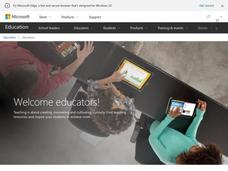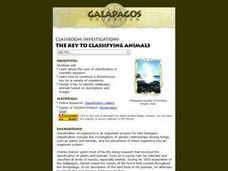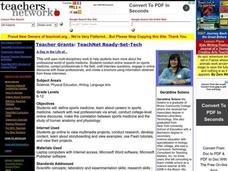Curated OER
Measurement, Perimeter and Area
Learners explore the concept of measurement. In this measurement instructional activity, students collect data about themselves such as height, finger length, neck circumference, foot length, and other body measurements. Learners cut...
Curated OER
Current Currencies
Pupils explore the nature of money and how foreign exchange rates work. They write reports based on their research.
Curated OER
Testing for Life’s Molecules
Want to hear a joke about sodium? Na. Young scientists test various materials to identify if they include protein, starch, and glucose by using the Biuret test, iodine starch test, and Benedict's test respectively. After practicing with...
Curated OER
Water and Ice
Students explore the forms of water. In this physics lesson, students use ice cubes and observe what happens when the ice melts. Students freeze the water again and record observations.
Virginia Department of Education
The Germ Theory and Koch’s Postulates
Explore the history of cholera and its effect on society with your biology class. Young biologists will then proceed to grow their own germs, prepared from live cultures, and follow the steps of the scientific method to generate data....
Curated OER
The Key To Classifying Animals
Explorers of the environment construct a dichotomous key for a variety of organisms and design a key to classify Galapagos animals based on descriptions and images. The lesson includes a link to an animal gallery and the worksheet for...
Curated OER
Amusement Park Physics
Learners get up close and personal with principles of motion. In this physics lesson, students collect and analyze acceleration data on amusement park rides. Learners use CBLs to collect data in this lesson.
Curated OER
Making Connections: Exploring Our Brains through the Five Senses
Young scholars record observations and create drawings and models of anatomy using their five senses. They describe the structures of a neuron and analyze each of their functions. They compare and contrast the typical structural...
Curated OER
Food For Thought
High schoolers examine their school population about their health and exercise patterns. They brainstorm a list of factors that influence people to eat the way they do.
Curated OER
Forces That Shape the Earth: Wind, Water and Erosion
In this forces of nature worksheet, students read a 2 page article on the forces of nature and answer 4 detailed comprehension questions about the forces of nature on Earth.
Curated OER
A Day in the Life
Students research questions related to sports medicine. They write an essay from the questions and create professional email accounts to email a professional in their field of interest. In addition, they interview their professional and...
University of Minnesota
Mirroring Emotions
Do you ever give your class the "teacher look"? Without saying a word, they become silent and engaged (hopefully). How do they know what you're thinking? Explore the concept of nonverbal communication and how it relates to our mirror...
California Academy of Science
Kinesthetic Astronomy: Mars Opposition Dance
Your class will watch as one child orbits the sun as Earth, while another orbits as Mars. If the timing is right, they will see the repetitive dance between the two planets and discover how often they are opposite from each other. For...
Community Resources for Science
A Whole New World of DNA and Proteins
Lead your young scientists into an exciting world as they participate in a role play and experiment focused on proteins and DNA. After researching the Central Dogma of Biology, individuals or groups participate in a classroom slide...
Curated OER
What Can I Do?
Students understand situations that cause different feelings. In this conflict resolution lesson, students read a story and complete an e-sheet about making good choices during conflict. Students to discuss the choices in the story and...
University of Minnesota
Neurotransmission Model
Don't lose your marbles — you'll need them for a lesson on neurotransmission. Young scholars build a neurotransmission model using marbles, beads, rubber bands, string, and other elements. After studying specific neurotransmitters,...
University of Minnesota
Dendritic Spines Lab
This is your brain on drugs ... literally! Your neuroscientists-in-training examine the evidence of drug use on the human brain and how neurons change their connectivity when altered by drugs. They then work together to create testing...
Lisa Staab Shadburn
Play Therapy Activities to Enhance Self‐Esteem
Discover activities to help learners increase self-awareness, build peer and family relations, and develop positive self-esteem. Here you'll find six suggestions for instilling a sense of confidence and self awareness in youngsters. Each...
Curated OER
Bears and Panthers Aplenty: Early Settlers Make a Home in Arkansas
Young historians research the Southwest Trail, which ran through Arkansas back in the 19th century. Pupils are divided into four groups. Each group researches a pioneer who blazed the Southwest Trail. Then, the group presents an oral or...
Teach Engineering
Mechanics of Elastic Solids
Make the connection between Hooke's law and elasticity with an activity that introduces the class to the behavior of elastic materials. The resource defines stress and strain to calculate the modules of elasticity of materials and also...
Earth Day Network
Healthy Earth, Sick Earth
Earth is sick and needs our help! Read the children's book Planet Earth Gets Well to explain the various problems facing the planet, discussing what young conservationists can do to heal the planet along the way. A great Earth Day...
Cornell University
Atomic Bonding
Explore the connection of surface area to bonding within atoms. Learners complete lab investigations to model changing surface area with different sizes and concentrations of atoms. A flour fireball demonstration follows the labs to...
Curated OER
Modeling the Seasons
Junior geologists become the force that makes the world go around! With a lamp on the floor in the middle of the room to represent the sun, volunteers hold a globe, revolve, and rotate. Observers notice how the light hitting the globe...
University of Minnesota
Connect the Neurons!
Create a neuron frenzy as your pupils play the part of the neurons. An engaging lesson creates a human chain of neurons that pass cotton balls posing as neurotransmitters. Scholars learn about pre- and post-synapses as they complete the...

























